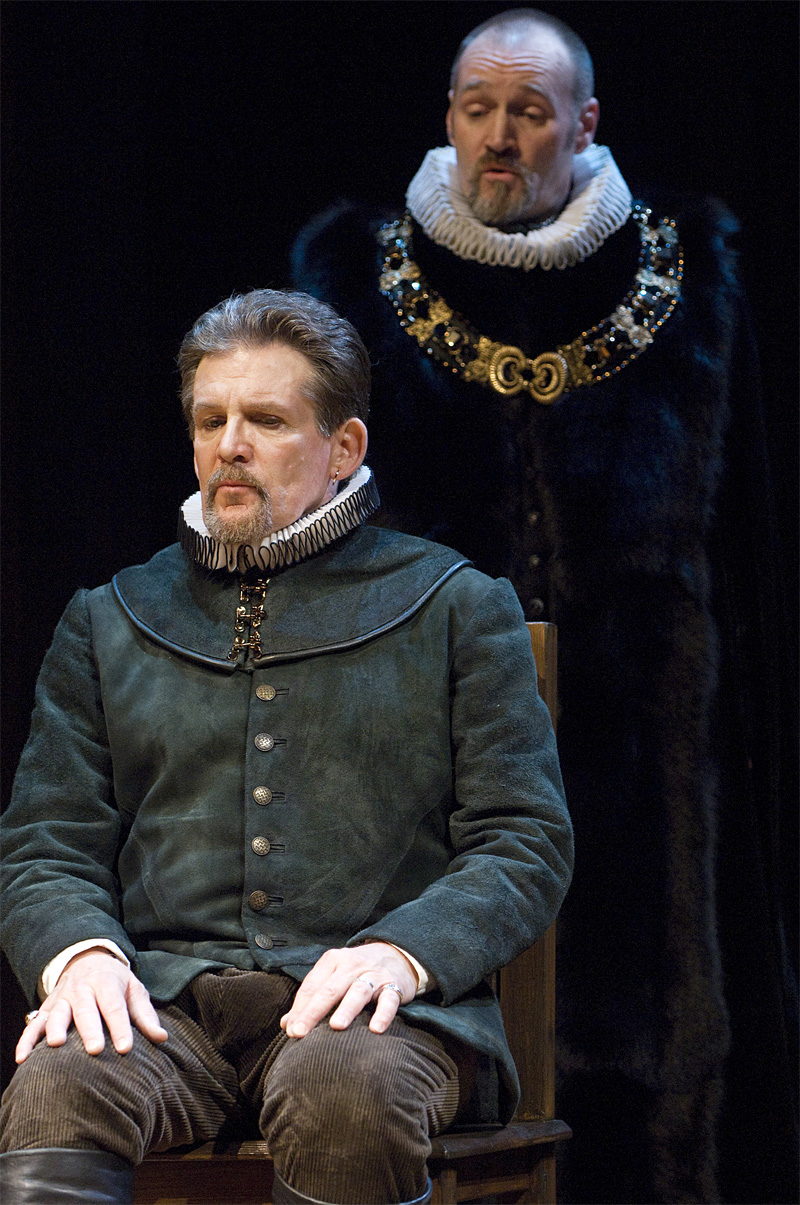Two things made me needlessly (and unfoundedly) apprehensive about this exalted import from Ashland’s Oregon Shakespeare Festival. One, the sheer decibel level of praise seemed impossible to warrant. Two, the format of procedural mystery having worn thin through overuse, I dreaded another Law & Order–style investigation, even one set in 1606. But within its first 10 minutes, Equivocation resoundingly knocked my petty prejudices aside. The buzz is wholly justified, the mystery delivers, and the journey is liberally scattered with bonus pleasures you wouldn’t associate with a terrorist-bomb plot (remembered today as Guy Fawkes Day).
Bill Cain’s play opens with a perfunctory “assignment scene,” in which midlife Shakespeare (Anthony Heald), here known as “Shag,” receives an order from King James’ chief advisor, Robert Cecil (Jonathan Haugen), to write a play about those damn Catholics—the Al Qaeda of Elizabethan England—who tried to blow up Parliament and kill the king. The commission is pure slop, and Shag recognizes the impossibility of creating great drama out of a non-event (the plot was discovered and the bombing averted). But the offer is non-negotiable, and Shag must write a blockbuster to save his own hide.
Numerous complications ensue as Shag investigates the 1605 Gunpowder Plot. It’s like an episode of Shakespeare: CSI, as he discovers the truth about the regime’s brutality and Cecil’s perfidy. His conscience compels him to indict his own patrons in the play, but covertly, so he doesn’t follow Fawkes to the gallows. His writing must equivocate, as Catholics did under torture by English Protestants, to conceal their actual faith—hence the title of Cain’s drama.
Meanwhile, Shag’s theater company divides over whether to resist the propaganda that Cecil demands they stage. And Shag’s brilliantly macabre daughter, Judith (Christine Albright), seeks approval, perchance even love, from her resentful, bereaved, and preoccupied celebrity dad.
Under the direction of Bill Rauch, the practiced OSF ensemble has been performing this play since April. Six actors cover 20 roles, transforming themselves physically and emotionally without inflicting on the audience a moment’s confusion about who’s who. Their delivery is energetic, in-the-moment, and always believable. Cecil’s odd limp reveals a fastidious man who spurns his own damaged leg with each step. Paraphrasing Shag, “the details sell the story.”
Spending time in the bosom of Shag’s theater company offers the audience fascinating and seamless, if sometimes confusing, transitions between scenes in the Bard’s imagination, his detective work, stage rehearsals, and flashbacks to the Gunpowder Plot. In short order it becomes evident that these perspectives are a continuum, different angles on the “truth” Shag is supposed to write. All of which illustrates what the other playwright, Cain, wants to tell us about supposedly settled historical truths.
Equivocation bucks a trend in modern theater—perhaps influenced by Hollywood screenwriting formula—toward simple themes and tidy endings. It refuses to gallop with blinders to an inevitable third-act conclusion. Cain gives us instead moral and dramatic complexity, a profusion of detail, and tangled motives.
What the play’s ultimately “about” may depend on what background issues you bring with you. Is the state-mandated anti-Fawkes fiction a bit like the shipboard “Mission Accomplished” banner during the War on Terror? Yes. But Equivocation‘s also concerned with parenthood, artistic license, and the difficulty of keeping actors on-script. Shag’s performers at the Globe Theater rebel at his texts’ ambiguities. One demands, “How can a day be foul and fair?” Another protests, “Why am I [King Lear] running around in a diaper?”
Transitions from the Globe to prison to King James’ court are smooth on Christopher Acebo’s simple semicircular set. It’s built of wood paneling—suggestive of a sauna—that reminds us how easily the Globe, like Parliament and all of London, could have been firebombed. Christopher Akerlind’s lighting design includes the eerie projection of a window gallery like a panopticon, under whose gaze everyone is suspect.
In this wonderfully swirling story about storytelling, the playwright’s daughter stands mainly on the periphery. But after a few funny soliloquies, Judith steps up to own the ending in a most deserved and satisfying way. It’s a joy to watch such an underserved character finally reach out and grab her birthright. If Shag can’t make sense of his crumpled drafts, his daughter will. (The resulting play has a familiar name.) She may not understand every nuance of his craft, but she knows history must be written in the moment, then debated later.








